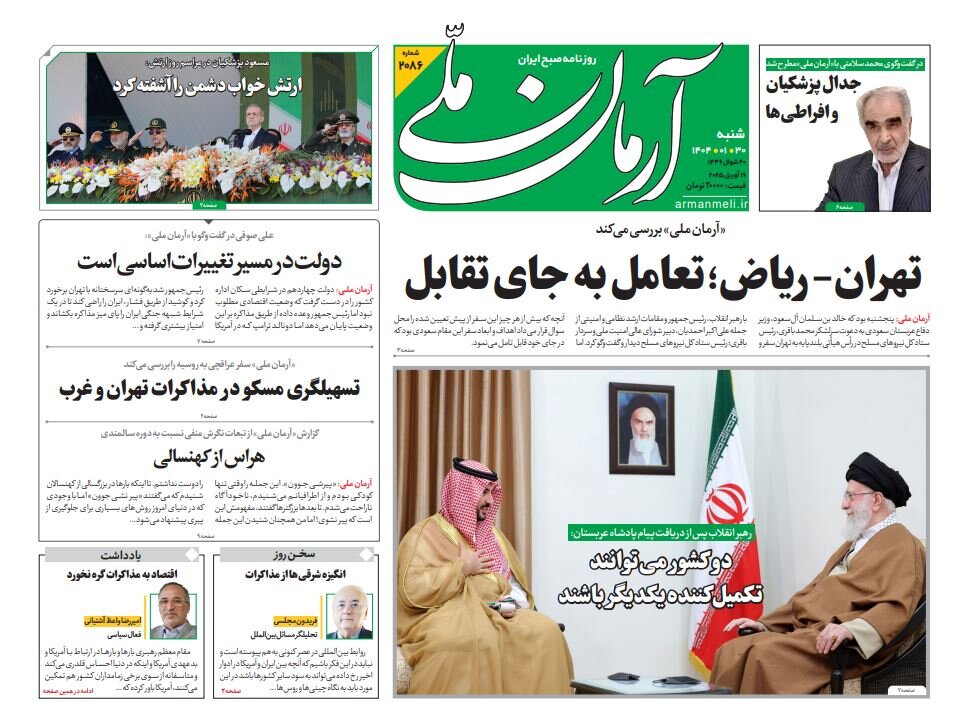Interaction, instead of confrontation, between Iran and Saudi Arabia

TEHRAN - Arman-e-Milli examined Saudi Defense Minister Khalid bin Salman Al Saud's trip to Tehran and noted: What made this preplanned trip important more than anything else were the goals and dimensions of this Saudi official's visit, which were worth considering in their own right.
This is in a situation where visits by senior Saudi officials to our country have been rare. A trip at this level and a meeting with high-ranking Iranian officials indicate an important issue. It seems that Khalid bin Salman, who is the brother of Saudi Crown Prince Mohammed bin Salman, was not simply engaging in discussions on regional issues to strengthen peace and stability. The fact that the Saudi king delivered a message to the Leader of the Revolution also indicated that he left Riyadh for Tehran for reasons beyond the immediate issues at hand. It is certain that Khalid bin Salman's trip to Tehran primarily focused on bilateral relations. In any case, the Saudis, observing the regional and international conditions, seek closer ties with Tehran across various fields to potentially address regional issues through these relations.
Kayhan: Multilateral diplomacy is Iran's meaningful message to Washington
In an analysis, Kayhan discussed Iran's multilateral diplomacy in its foreign policy and said: In a time when the United States and the West can no longer play their undisputed and hegemonic role in the world, Iran, by taking advantage of its regional and global capacities, has taken the path of "multilateral diplomacy" with strength and determination. This shows that neither Washington nor the diplomatic smiles of the West would determine the future of the country's foreign policy. The Leader of the Revolution also said that the country's issues should not be tied to these talks, and the mistake made in the JCPOA should not be repeated because the country becomes conditional and everything, including investment, will be delayed until the outcome of the negotiations becomes clear. Now, the Ministry of Foreign Affairs, headed by Seyyed Abbas Araghchi, has chosen a new path in which negotiations to lift sanctions continue through indirect diplomacy, but not as “everything” but alongside other tools of power and paths of global engagement. In fact, the country’s diplomacy is simultaneously pursuing the lifting of sanctions and actively pursuing the path of neutralizing them.
Hamshahri: Will Iran and Trump turn tensions into an agreement?
Hamshahri discussed the second round of talks in Rome and the possibility of an agreement between Iran and the United States in a note. It wrote: The second round of talks between Iran and the United States was held in Rome under conditions different from the first round. Iran has proposed a three-stage plan that may include limiting uranium enrichment, increasing access for IAEA inspectors, and suspending some nuclear activities in exchange for lifting sanctions. The most likely scenario is a limited agreement in which Iran stops 60 percent enrichment and the United States suspends some of the sanctions. Such an agreement would allow Trump to claim victory and give Iran a chance to reduce economic pressure, but distrust threatens its sustainability. The Rome talks would likely result in a temporary agreement that both sides will highlight as a victory. But behind the scenes, Israel may be preparing for limited strikes in secret coordination with the United States. Iran, too, is seeking to reduce pressure by aligning with Russia and proposing a three-stage plan. The outcome will be clear by the expiration of Resolution 2231: either a fragile agreement or new tensions.
Shargh: Diplomacy in the shadow of distrust
In a commentary, Shargh dealt with the challenging negotiations between Iran and the United States. It wrote: Although the change in the place of the negotiations does not carry a specific message in the ambiguous and complex atmosphere of these negotiations, the details can also be considered important signs. According to Araghchi, the change in tone and positions in the American team indicates the lack of seriousness of part of the United States in these negotiations and will increase distrust. On this side of the table, Iran continues to adhere to its positions in the negotiations, although what can be seen from Tehran's tone and positions indicates the continuation of serious distrust of Washington's intentions and behavior. In the current situation, trusting the diplomatic team and following the path adopted by the ruling system is essential. Now all eyes are on Rome. Diplomacy is underway amidst doubts, contradictory messages, and the desire to resolve a protracted issue. But the continuation of this path depends on whether the parties are willing to overcome the gaps, or once again, hopes will fade in the shadow of distrust.
